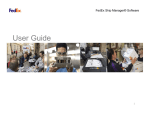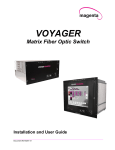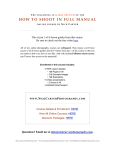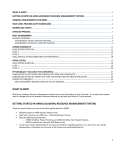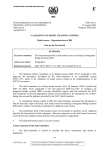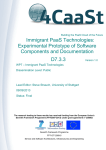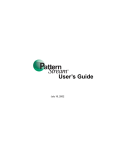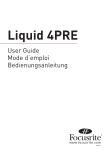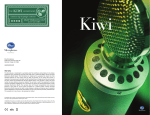Download DATA STREAM: A SOFTWARE THRILLER - I
Transcript
DATA STREAM:
A SOFTWARE THRILLER
By Steve Jackson
Draft OCT 29, 2014
I-TECHNOLOGY INC. CONFIDENTIAL
1
FOREWORD
In the heady days of WWII, the Lockheed Martin Aircraft Corporation in Burbank, California
was commissioned by the US Air Force to develop a high speed, high altitude jet fighter to
counter the increasing German jet aircraft threat. Its response was to set up the Advanced
Development Projects Division. A select group of individuals was assembled to concentrate
on development of what would become the P-80 Shooting Star, the first operational jet fighter
used by the US Air Force. It was designed, built and delivered in just 143 days.
A tent set up next to a plastics factory became the incubator for the team and its special
“project”. Fumes that wafted in from the plastic factory made for an obnoxious atmosphere or
skunk-like smell that nobody really appreciated working in. As a result it was nicknamed the
Skunk Works, a name that has since become an official alias for the division. The Skunk
Works has changed locations and gone on to develop a number of significant aircraft for
Lockheed.
From its early beginnings, a “Skunk Works or Skunkworks” project has come to signify a
project of radical innovation developed by a select team or group of people who do all the
research and development. It is accomplished with a high degree of autonomy and often
secrecy. It occurs outside of the mainstream of general R&D and manufacturing.
Bureaucratic interference is minimized or even eliminated for this group and its project(s).
The original “Skonk Works” (as it was called) was a fictitious moonshine factory in the popular
Li’l Abner comic strip.
I-TECHNOLOGY INC. CONFIDENTIAL
2
TABLE OF CONTENTS
1 - We Are Introduced to Norman Swift and the Story Begins
5
2 - Norman Launches the Skunkworks
7
3 - The Datastream Records Are Specified
10
4 - The Datastream Schema Is Designed
14
5 - The User Interface is started
16
6 - The First Engine Is Designed
18
7 - The First Database Is Designed
21
8 - ACME's Business Intelligence Is Begun
23
9 - Acme's POS Is Begun
25
10 - Acme's Loyalty Reward Program Is Begun
26
11 - Acme's WHMIS System Is Begun
28
12 - Acme's Gift Card Program Is Begun
29
13 - Acme's Payment System Is Begun
30
14 - The Skunkworks Goes Home-Office
32
15 - The Skunkworks Gains Additional Developers
33
16 - New Fields Are Added To A DS Record
34
17 - A New Engine Is Tested With Old Data
35
18 - A New BI Strategy Is Mandated
36
19 - A Supervisor Engine Is Designed
37
I-TECHNOLOGY INC. CONFIDENTIAL
3
20 - A Publish and Subscribe Service Is Harnessed
38
21 - Syslog Messages Are Launched
39
22 - Building Security Is Designed
40
23 - Disaster Recovery is Designed
41
24 - e-Discovery is Designed
42
25 - Assured Chain-Of-Custody is Designed
43
26 - ACME RENTALS Gains an Online Reservation System
44
27 - ACME RENTALS Gains an Inter-Store Transport System
45
28 - The Team Tackles Asset Management
46
29 - The Team Tackles A Gun Registry
48
30 - The Team Concludes That DS is Agile
51
31 - The Team Tames a Lion
53
32 - The Team Controls Traffic Signals
55
33 - The Team Wrestles with BPM, DCM and CRM
57
34 – The Team Tackled Atomicity
59
35 - The Team Tackled Race Conditions
61
36 - The Team Tackled Insurance
62
37 - The Team Built a Supermarket Product Locator Terminal
63
I-TECHNOLOGY INC. CONFIDENTIAL
4
CHAPTER ONE
In Which
We Are Introduced to Norman Swift
and the Story Begins
It was a dark and stormy night. The clock struck one as Norman Swift was putting the final
touches on his plan for his first Skunkworks project. He was excited – at long last, he was
ready to test his cherished concept for a high-performance software development
paradigm. He rolled the word paradigm off his tongue a couple of times. Was he being
audacious in thinking that his concept amounted to a new paradigm in software development
and implementation? He had mulled it over and over; he was convinced it was.
Norm mentally reviewed the last ten software projects at Norman Swift & Associates. All had
been disappointing, some disastrously so. In fairness, two were not awful, because they were
cancelled before the awfulness became apparent! He wondered for the thousandth time why
he was in the software game. “Because I need to be in some game”, he muttered. “At least
it's warm and dry here.”
Norman had identified the root problem long ago – Requirements Drift!
We never get to design, build, test and deliver a project without late-arriving change
orders tearing apart the fabric of our work.
This happens because of the “I'll Know It When I See It” phenomenon. You deliver a
feature as specified and the user realizes that it is not what they need. “Keep trying
until I know it's right.”
This happens because business is complex and intricate, always in flux.
I-TECHNOLOGY INC. CONFIDENTIAL
5
BUT, we know these things, and they are not going to change, so why do we not have a
flexible development paradigm that welcomes late-arriving change orders?
Why are we always surprised and devastated by the inevitable?
Duh!
Norman sighed. That sometimes seemed to help.
I-TECHNOLOGY INC. CONFIDENTIAL
6
CHAPTER TWO
In Which
Norman Launches the Skunkworks
The crew straggled in to the conference room just before 9 am. They were Eric, Brian, Ann,
and Phil. They represented some 35 years of accumulated software development
experience. Norm had the highest respect for their talents and the collective potential they
brought to the table. If anybody could understand what he was about to bring forth and then
run with it, they could.
Norm pushed the door closed and drew a deep breath. “OK, team; I have good news and
bad news.”
Brian –
“Bad first.”
Norm –
“The bad news is that we lost the Ziffer bid, so I have no funded work for you
guys.”
Eric –
“That's pretty bad news, Norm. Not much room left for the good news.”
Norm –
“The good news is that I have long wanted to do a Skunkworks project, and I
am gonna launch it now during this slow period. I want you guys on my team.
The funding is internal, since there is no client money for this.”
Eric –
“What if we had asked for the good news first?”
I-TECHNOLOGY INC. CONFIDENTIAL
7
(laughter)
Ann –
“No offence Norm, but this is not a rich company. How long can the Skunk go
on nothing but internal financing?”
Norm –
“We have four weeks. A month from now we will have developed the reference
application of a shiny new software development paradigm that I call
Datastream.”
Phil –
“And we can do all that in four weeks you say? Norm, are you new here?”
Norm –
“Guys, this is a powerful concept that I've been mulling over for many years.
Now is the time to launch it. It's now or never. In 5 weeks I will be a prophet, or
else the newest greeter at a Wally's.”
Eric –
“OK, Boss, what is this new secret sauce?”
Norm –
“It's real simple – just two rules:
One, we will record everything of interest, indelibly and unambiguously, in
Datastream records. That will be the sole enduring storage method available.
Two, all the computing will be done in engines whose application is to read and
write Datastream records.
That's the new paradigm in a nutshell.”
Ann -
“That's it? That's your inspiration? It's kinda thin. This sounds like the unit
record punch cards in the 1950's. But we've come a long way since then,
Norm.“
Norm -
“Well, if this paradigm is as good as I claim, it will be apparent from week one.
You won't have long to wait.”
Phil –
“What's the reference application? Something simple, I hope.”
I-TECHNOLOGY INC. CONFIDENTIAL
8
Norm -
“Not so simple. I call it Acme Rentals – an equipment rental chain of 100
outlets. They trade tools and supplies among stores and they need to track
rental and return times. Their asset base is over 100,000 items, big and small.
It's a significant logistics challenge, for sure! PLUS they need business
intelligence.”
Eric -
“OK, but this is a job for the Enterprise Resource Planning giants, not for us.
Jobs like this consume a million man-hours.”
Norm -
“Yes, I agree with you Eric. The normal paradigms do need that kind of effort.
But this is a new broom. A Skunkworks. If the reference application were
smaller, the victory would be less dramatic.”
Ann -
“So this is a David vs. Goliath kind of deal?”
Norm -
“Yup.”
I-TECHNOLOGY INC. CONFIDENTIAL
9
CHAPTER THREE
In Which
The Datastream Records Are Specified
Norm -
“OK, let's get started. Here's what we're gonna do. Make up a project
spreadsheet with a different sheet for each type of Datastream record. These
Datastream records will be indelible, meaning that they are read-only after
creation.
So how are errors corrected? By means of a new Datastream record to be
published when the error is detected. Them's the rules.
We need to decide what is of interest to Acme. First and foremost, there is the
Asset Record. It describes each asset item in unambiguous detail. So there
needs to be the Serial Number, Manufacturer, Date of Acquisition, Description,
Price paid, etc.”
Eric -
“Not certain that I agree with you there, chief. Your date of acquisition implies
this item is unique, whereas Acme has several of everything. Best to have an
Asset Descriptor Record that is prototypical of the asset model. So it just needs
Acme Inventory Number, Model Number, and Manufacturer. Other traits like
Serial Number, Colour, Date of Purchase, Price Paid, etc. can be in a different
Record – call it Item record.”
Norm –
“Good observation, Eric. Well, the record names can change as we mature here
and the big picture becomes clearer. What's important is that the sheets each
include the fields that are necessary for that record to be authoritative and
unambiguous.”
Norm -
“Ann will maintain a central Dictionary of the Datastream records. We have to
I-TECHNOLOGY INC. CONFIDENTIAL
10
protect the integrity of the field definitions closely.”
They made steady progress. Each Datastream record formation issue was decided by
Acme's business policies and rules. It took most of the day to codify all (or most) of these
rules.
At 4:30 pm Norm summarized the day.
Norm -
“OK Team, we are 5 person-days into the project and already we have laid the
keel for the good ship Acme Rentals, because we have defined some 27 key
Datastream record types.”
1. ITEM DESCRIPTION
2. ITEM PURCHASE
3. ITEM RENTAL
4. ITEM SALE
5. ITEM REPAIR
6. ITEM LOSS
7. CLIENT PURCHASE ORDER
8. STAFF PAYROLL ITEM
9. STAFF VACATION ITEM
10. EXPENSE PAYOUT
11. WHIMIS REQUEST
12. ITEM USER MANUAL REQUEST
13. CAPITAL EXPENSE – REPAIRS
14. ITEM INTER-STORE TRANSFER
15. RENTAL OPPORTUNITY LOST
I-TECHNOLOGY INC. CONFIDENTIAL
11
16. ITEM RESERVATION REQUEST
17. ITEM RESERVATION GRANT/DENY
18. UTILITY METER READING
19. DOOR ACTIVITY
20. SECURITY ALARM ACTIVITY
21. STAFF TIMECLOCK ITEM
22. VEHICLE ITEM
23. FUEL PURCHASE
24. LUBRICANT PURCHASE
25. SUPPLIES PURCHASE
26. VENDOR DEMOGRAPHICS
27. CLIENT DEMOGRAPHICS
Phil -
“I like this process, Norm. It seems like we are actually accomplishing
something here.”
Brian -
“Yeah, because this foundation work will endure regardless of specification
change orders down the road.”
Ann -
“Not to be negative, Norm, but all we've done is list these records as being ‘of
interest’ to Acme Rentals. We have not done the work to create even one of
these.”
Phil -
“Ann, you're looking at this wrong. The Datastream paradigm is supremely
liberating because it separates the creation from the storage from the use of
these records. We can proceed with these tasks in any order, and with good
confidence that we are contributing to the final solution. We've never had that
before!”
I-TECHNOLOGY INC. CONFIDENTIAL
12
Ann -
“Hmmm.”
Eric –
“Norm, this is the first day at Swift & Associates that I've truly enjoyed. We have
made solid progress with good harmony. Every disagreement has been
resolved using this method and nobody got angry.”
They broke at 5 pm.
I-TECHNOLOGY INC. CONFIDENTIAL
13
CHAPTER FOUR
In Which
The Datastream Schema Is Designed
On Tuesday morning Norman launched his team into Day 2.
Norm -
“It's time to build the Datastream infrastructure so we can make the data we
have defined available to the engines we are going to build. I want this to be a
cloud application and we are going to use a standard database product to store
the data.”
Ann -
“I nominate MYSQL. It's free, sophisticated and there's lots of help out there.”
Norm -
“I agree Anne. MYSQL it is.”
Brian -
“As I see it we first need tables to store the data about the data. That is the
metadata. I see several tables. The first describes the data record - an identifier,
a record descriptor and a tenantID so we can accommodate more than one
company. The second describes the fields in the record. This will include: a
record type (which is the link to the identifier in the record descriptor), the field
number, field name, length, type, a description and the requisite tenantID.”
Ann -
“That seems simple enough. What about storing the data?”
Brian -
“I see two tables: The first stores the record information ( a unique key, a record
type that links to the identifier in the record descriptor, a date time to tell when
the record was created, a status to indicate if this is an original record or a
modification of a previously created record, the creator's identifier and the
tenantID. The second will hold the actual data and will have a record for each
field. It will have a unique key, a record number that links back to the record
I-TECHNOLOGY INC. CONFIDENTIAL
14
information table's key, the field number, the data and the tenantID.”
Norm -
“Let's store the data in strings . A string can characterize any data and I'm not
worried about storage efficiency here. You can buy a terabyte disk for $100.”
Eric -
“There's going to be a lot of data here Norm. Storage isn't a problem as you
say, but search times might be.”
Brian -
“Let's generate working tables for each data type. The user interface can work
with the working tables and the Datastream will mirror what goes on in these
tables. The tables will contain only the data of a specific type so we will divide
and conquer.”
Eric –
“If we keep the Datastream and the working tables synchronized so that when
we change one, we change the other, we can reduce the times we have to
re-construct the working table. This will make things peppier.”
I-TECHNOLOGY INC. CONFIDENTIAL
15
CHAPTER FIVE
In Which
The User Interface is Started
Later Tuesday morning Norman got into the GUI.
Norm -
“So how are our clients going to interface with our new paradigm?”
Ann -
“Cloud. It has to be a Cloud application.”
Norm -
“Why is that?”
Ann -
“Well, we don't know what infrastructure our future clients will have. It could be
Windows or an Apple OS or Linux. We don't know what the state of their
hardware will be. All a cloud app needs is a browser and that's available on
pretty much any system. Also, deployment will be butt simple (excuse my
French). Web applications will scale with the enterprise and we can find
multi-lingual support. The Cloud is where it's at these days.”
Eric -
“What about security?”
Ann -
“Cloud security is improving all the time. Access can be through an encrypted
connection and the sign-on security will be the same as for an in-house
application. The data will be housed in a data fortress and backed up by
professionals and all this goodness happens without the client requiring an I.T.
Staff.”
Norm -
“O.K. You've convinced me. What web application will we use?”
I-TECHNOLOGY INC. CONFIDENTIAL
16
Ann -
“There are many. I would look for one that provides the easiest development
process but has enough features to allow us to do some sophisticated things.”
Norm -
“O.K. Anne. Do some research and let me know what you recommend in a few
hours.”
. . . . . . . . Later . . . . . . . .
Ann -
“Norm, I think WaveMaker would be a good choice for us. It uses JAVA and
JavaScript coding and has tools for deployment and database activities. The
drag and drop table tools will allow us to quickly provide a user interface to the
working tables and we can express the business logic in JAVA on the server.”
Norm -
“I trust your opinion Anne. Let’s go with Wavemaker.”
. . . . . . . . Even Later . . . . . . . .
Ann -
“I installed WaveMaker and MYSQL and put up the preliminary database. I
created an input screen for the Datastream metadata and I've loaded the data
definitions that we decided on. I am also developing an application that will
generate working tables from the data definitions.”
Norm -
“Good work Anne. You're a dynamo!”
I-TECHNOLOGY INC. CONFIDENTIAL
17
CHAPTER SIX
In Which
The First Engine Is Designed
On Wednesday morning Norman launched his team into Day 3.
Norm -
“Yesterday we laid the keel of the good ship Acme. Today we will begin crafting
and welding together the parts of the ship - the decks, pumps, engines,
propellers, etc.
In our Datastream paradigm we will need logic routines to act on the Datastream
records, in order to express Acme's business rules while conducting Acme's
minute-by-minute business. I call these ‘logic engines’.”
Ann –
“Norm you are waxing poetic about this design – likening it to a ship.”
Norm –
“Well, the software designs built using the Datastream paradigm will always be
elegant. Even after the late-arriving change orders.”
Eric -
“OK, great. But what about the other types of business rules that cannot be
expressed through these engines. How will that logic be expressed?”
Norm -
“Don't worry about that happening. The set {of business rules that cannot be
expressed through these engines} is a null set.”
Norm -
“The engines all use the same interface or API. Who can guess what that API
is?”
Eric -
“Haven't got the foggiest clue, Boss.”
I-TECHNOLOGY INC. CONFIDENTIAL
18
Ann -
“Me neither.”
Norm -
“Would you be surprised if I said that the API is the Read/Write of Datastream
records?”
Eric -
“You mean these engines can read and write Datastream records and that's all
they can do?”
Norm -
“Yes, exactly.”
Ann -
“But where's the GUI located?”
Norm -
“The user-facing GUIs are all inside engines.”
You could hear a pin drop.
Eric -
“OK, and where's the master database? We have not even begun its design. So
how can this work?”
Norm -
“Sure there's a master database. That's what we did yesterday.”
You could hear a pin drop.
Eric began deep breathing, loudly. “I'm having a panic attack over here!”
Norm -
“This is a new paradigm. This is business as UN-usual. Our “database” is the
accumulation of the Datastream records. That's how we do things here. Trust
me, Acme Rentals will be well served.”
Ann -
“OK, how will these engines communicate with each other and with Datastream
records? We're gonna need a message protocol.”
Norm -
“The protocol is Publish & Subscribe. Each Engine Subscribes to Datastream
records of specified Types, meaning the Records which carry data that are
relevant to the engine's mission. Recall that each Datastream type is on a
separate sheet.”
Phil -
“And each engine writes Datastream records that are the result of its mission, to
express the business rules of Acme Rentals?”
I-TECHNOLOGY INC. CONFIDENTIAL
19
Norm -
“Yes, exactly.”
You could hear a pin drop.
Ann -
“But, nobody does computing like that these days. This is antiquated unit record
thinking. It's 1950's stuff. We'll get fired!”
Norm -
“This new paradigm is a resurrection of an old paradigm, empowered by modern
technology.”
Eric -
“OK, so give us an example of an engine that only does R/W of Datastream
records.”
Norm -
“Well the engines are inspired by the transactions that Acme performs during its
daily business. Say I come to the counter and want to rent a claw hammer,
which is Item #129 in the catalogue. We create and publish a Datastream
record saying “Need 1 of #129 at Store 12 for 14:00 on Oct 9-12”. Because
those are the facts of interest just now. No need to identify me as the client yet.”
Phil –
“So we published a Datastream record. Then what do we do?”
Norm –
“We wait.”
Ann –
“And what are we waiting for, Norm?”
Eric –
“I know! We are waiting for a Datastream record sent by an engine that
subscribes to 'need' records, and will inform us as to availability of Item #129. It
checks its hidden database of inventory and sends this Datastream record:
‘Send 1 of #129 SN 762345 to Store 12 for Oct 9-12’.”
Norm -
“Correct! The whole population of engines can see the Datastream records, or
the ones they subscribe to.”
Ann –
“Where exactly are the Indelible Storage units located?”
Norm –
“They can be located anywhere on the Internet, and the engines can be located
anywhere, as well.”
I-TECHNOLOGY INC. CONFIDENTIAL
20
CHAPTER SEVEN
In Which
The First Database Is Designed
Norm -
“OK, so Phil I need you to make a database of the Items available for sale.”
Phil -
“But Boss, you said there would be no databases. That sure was a short-lived
rule!”
Norm –
“I said the Datastream records are the enduring, eternal store in our universe,
and NOT the central relational database that everyone else uses. But we are
free to make HIDDEN databases to facilitate the work inside our engines.
‘Hidden database’ means that the database is never exposed outside its host
engine, and if it crashes it is easy to rebuild from the historical Datastream
records.”
Phil –
“OK, I see the difference now. Still, we need a database analyst don't we?”
Norm -
“No we do not need a database analyst. Because we are all capable of making
small databases and that's all we will need. If we had a database analyst, she
would take over the project and I can't let that happen.”
Phil -
“OK, I get it.”
Norm -
“Phil have you heard of ‘Green Databases’?”
I-TECHNOLOGY INC. CONFIDENTIAL
21
Phil –
“Yes – that's when a database has just one user. It is very rare in practice.”
Norm -
“Correct! And our hidden databases are Green. We do NOT share them with
other users because there's no need. Each user will build his own hidden,
Green database from Datastream records.”
Phil –
“OK. But how am I supposed to make the database?”
Norm –
“The Datastream records have recorded every event in Acme's business history.
All the things that Acme owns were purchased, right? So you can build the
database from the purchase database records. And you can assume that
there's a start-up spreadsheet given to us.”
I-TECHNOLOGY INC. CONFIDENTIAL
22
CHAPTER EIGHT
In Which
ACME's Business Intelligence Is Begun
Norm –
“Brian, I want you to get started on the business intelligence for Acme.”
Brian –
“Now Norm, you have gone over the brink! How on earth can I do business
intelligence before any database exists? Anything I write would be a guess and
will certainly be scrapped later in the project.”
Norm -
“There you go again, assuming a central database when you know it won't exist.
Central database is for THEM, not for US.”
Brian –
“I'm beginning to get your message. You're gonna tell me that the business
intelligence will always come from the accumulated transaction Datastream
records.”
Norm –
“Yup. The Datastream records will certainly capture all the transactions that
business intelligence seeks to analyze, for the simple reason that the
Datastream records CAUSED every transaction to happen. Nothing moves at
Acme Rentals unless Datastream records cause the movement. So no detail
can hide from Datastream analysis.”
Brian –
“Yes, that is a proof, Norm. OK, I will get started on business intelligence as you
asked. And I will do the work with full confidence that I am contributing to the
final solution, even though that solution has barely been sketched out!”
I-TECHNOLOGY INC. CONFIDENTIAL
23
Norm -
“That's the stuff, Brian!”
I-TECHNOLOGY INC. CONFIDENTIAL
24
CHAPTER NINE
In Which
Acme's POS Is Begun
Norm -
“Now, what shall we do for a Point of Sale (POS) system? Who has some
ideas?”
Brian –
“OPEN/POS does a nice job.”
Eric –
“I think we need to do our own POS, in Datastream.”
Brian –
“That's goofy. It takes years to do a POS system. I know, I've been there.”
Eric –
“Granted. But now we're a Skunkworks, and we perform Miracles every day.
Besides, what is a POS but what we've been doing from the start? All we need
is a method to sum up the prices and collect payment.”
Brian –
“I can't really argue with that, Eric.”
I-TECHNOLOGY INC. CONFIDENTIAL
25
CHAPTER TEN
In Which
Acme's Loyalty Reward Program Is Begun
Norm -
“Now we need a loyalty reward system. It pays $20 off, say, on every 5 th rental
invoice. Of course, it ties into the business intelligence system because it is an
incentive for the clients to give us their ID. We can do a lot more with business
intelligence if we know who our clients are.”
Ann -
“These transactions will have to be at the same retail store, right? We can't give
credit for transactions system-wide.”
Brian -
“Now Ann, why would you say that?”
Ann -
“Because it's obviously true! If we want system-wide credit then we will have to
launch a loyalty server, or sign up with a commercial service.”
Eric -
“How about this concept – let's build a loyalty engine and have it subscribe to all
the sales data. It will certainly be system-wide, because Datastream is
system-wide!”
Ann -
“OK, I see what you are saying. Yes, we can do that! The loyalty engine will
publish a reward Datastream record when it calculates that a $20 reward has
been earned, because this is the 5th transaction for this client. And the POS
system will subscribe to these reward Datastream records, and will deduct the
$20 discount from the amount owing, if the Datastream record specifies this
client as the recipient. Sure, that will be easy to build.”
I-TECHNOLOGY INC. CONFIDENTIAL
26
Norm -
“Now Ann, why did you expect that Loyalty would be difficult?”
Ann -
“Norm, just shut up.”
I-TECHNOLOGY INC. CONFIDENTIAL
27
CHAPTER ELEVEN
In Which
Acme's WHMIS System Is Begun
Norm –
“Now we need a Workplace Hazardous Materials Information System. Acme
Rentals is required to inform clients about potential hazards with their rental
equipment and supplies.”
Phil -
“OK, this should be easy. All we need is an Engine to subscribe to the items
rented and check a hidden database against WHMIS requirements. When we
get a match, we publish a Datastream record with the pdf file name of the sheets
that need to be printed and handed to the customer. These files will be on a
server, I suppose.”
Norm -
“OK Phil, get started with that approach and we'll see how it performs.”
I-TECHNOLOGY INC. CONFIDENTIAL
28
CHAPTER TWELVE
In Which
Acme's Gift Card Program Is Begun
Norm -
“Now we need a gift card interface. Who knows about that?”
Ann -
“I worked on an interface last year. There are stored value cards and central
lookup cards. Some systems require a high-security terminal at POS so the
transaction messages are secured.”
Norm -
“Sounds like the gift card interface can be a function of the POS engine, then.”
Ann -
“Yes, we could do that. Or, we could make a gift card engine that happened to
be running on the same PC as the POS Engine.”
Norm -
“OK, so the Datastream records would be published the same, regardless of the
method used?”
Ann -
“Maybe. I'll get back to you on that.”
I-TECHNOLOGY INC. CONFIDENTIAL
29
CHAPTER THIRTEEN
In Which
Acme's Payment System Is Begun
Norm –
“Now we need a payment capability. That means cash, credit card, and open
account terms for the trades. I suppose the POS Engine will either:
a) Publish a Datastream record to say that money was received in cash, or
b) Publish a Datastream record to say that money was received from a payment
terminal at the retail counter and describe the tender type, or
c) Publish a record indicating the sale was compiled along with the authorizer's
name.
d) Publish a request for open account credit from the A/R engine.”
Ann -
“In case (c), an A/R engine will subscribe to these requests and it will check
against the account status, and the engine will create a Datastream record
indicating that credit was extended or denied.”
Eric -
“How will we balance the cash?”
Phil -
“Of course, the sum of the Datastream records with cash payment must be the
net amount in the drawer.”
Norm -
“The cash float amount? It can be declared in a Datastream record at the start
I-TECHNOLOGY INC. CONFIDENTIAL
30
of the day.”
Brian -
“Pickups and loans can be Datastream records through the day. And also
payouts.”
Norm -
“So we are creating our custom POS system for Acme Rentals, bit by bit.”
I-TECHNOLOGY INC. CONFIDENTIAL
31
CHAPTER FOURTEEN
In Which
The Skunkworks Goes Home-Office
Norm –
“OK now comes a big change. We're all gonna work from home . That will save
the cost and time of commuting. We will meet Friday mornings at some central
place. We can be in frequent contact by video Skype. We all have cable
Internet at home.
Here are the productivity standards that I expect each member to meet. I want
three new engines per week – even if they are prototypes that don't do much
yet. But they are publishing and subscribing the specified Datastream records.
Also, I want constant deliverables after week 2. That means a working system
that is always running, and gains functions every week. Our deadline is 2
months. So we will have gained a factor of 25 in productivity!
If there is a big disagreement in methods then we will build both. No need for
conflict in the Datastream universe. Because the cost is low, we can afford to be
playful with engine logic.”
Phil -
“Woo Hoo!”
They all went home.
I-TECHNOLOGY INC. CONFIDENTIAL
32
CHAPTER FIFTEEN
In Which
The Skunkworks Gains Additional Developers
By video Skype:
Norm –
“We are falling behind with the engine production. How can we speed this up?
Without killing ourselves, I mean. We support the ‘9-to-5 company goals’.”
Eric –
“How about Elance. We know how to specify the logic for a new engine, and we
can declare the Datastream records as C strings. It is easy to test engines to
see if they perform as required. So let's post the engine production on Elance.”
Ann –
“You know, that could work! If we identified 4 contract programmers and they
could each build 2 engines per week, we'd soon have the 20 engines we need.”
Norm -
“Yes, at that rate it'd take 20/8 = under 3 weeks. Let's give it a try!”
I-TECHNOLOGY INC. CONFIDENTIAL
33
CHAPTER SIXTEEN
In Which
New Fields Are Added To a DS Record
Ann -
“I hate to be the bearer of bad news. But the record type 12 needs two new
fields. Sorry to be disruptive.”
Eric -
“Not a problem Anne, just define a new Datastream record, type 122 and make
it the same as Type 12, but append the 2 fields. Then the old engines will be
compatible.”
Phil -
“This is great! This avoids the pollution of cell definitions that happens with
normal record data bases. You know – the disaster when a field definition is
altered but nobody knows exactly when or what is was before the change. That
erodes confidence in historical data, and makes the database suspect,
unreliable.”
Brian -
“Should the engine that publishes Datastream record type 122 also publish type
12, to be polite to the old subscribers?”
Eric -
“Yes. Or, perhaps another engine could take on that task - i.e., to publish a type
12 whenever it sees a type 122.”
I-TECHNOLOGY INC. CONFIDENTIAL
34
CHAPTER SEVENTEEN
In Which
A New Engine Is Tested With Old Data
Norm -
“We have refined several engines to work better, based on experience in the
stores. How can we test these new engines?”
Ann -
“Not a problem, Boss. We can simply feed them the historical Datastream
records and watch what they do. In effect, we can re-live the past and see how
these engines would have performed had they been in existence back then.”
Phil -
“That is so cool! I don't think any other paradigm supports that capability.”
I-TECHNOLOGY INC. CONFIDENTIAL
35
CHAPTER EIGHTEEN
In Which
A New Business Intelligence Strategy Is Mandated
Norm -
“There's a new VP Sales at Acme and he wants a new business intelligence
strategy. It's something weird he learned at B-School.”
Ann -
“Not a problem. Whatever it is we can code a business intelligence engine for
him.”
Brian -
“But won't that upset the users of the existing business intelligence engine, to
make this change?”
Norm -
“Well there can be a dozen business intelligence engines. They do not collide.
And they are all cheap to run. So everybody wins!”
I-TECHNOLOGY INC. CONFIDENTIAL
36
CHAPTER NINETEEN
In Which
A Supervisor Engine Is Designed
Norm -
“We have invented several dependencies, where an engine is waiting for a
response from another engine. But what if that response does not come? We'll
have a stalled business process and that is ugly!”
Ann -
“Yes, I've been thinking about that danger. How about a supervisory engine that
looks for over-due responses? Of course everything is visible in the Datastream
stream.”
Norm -
“OK. And we could also publish an ‘overdue Datastream record’ when an engine
feels it has not received service in a reasonable time. The supervisor can then
launch a new engine to do the required work.”
Ann -
“And the helpdesk can subscribe to these alerts so they can make changes if
needed, even before anyone knows there's a problem.”
I-TECHNOLOGY INC. CONFIDENTIAL
37
CHAPTER TWENTY
In Which
A Publish and Subscribe Service Is Harnessed
Phil -
“Norm, let me do the Publish & Subscribe infrastructure. I learned a lot about it
at a previous job.”
Norm -
“OK Phil, go ahead. You will probably use an Open Source solution?”
Phil -
“Yes, of course. Stay tuned.”
I-TECHNOLOGY INC. CONFIDENTIAL
38
CHAPTER TWENTY-ONE
In Which
Syslog Messages Are Launched
Brian -
“We got a crazy request from a client. He wants to interface with Kiwi Syslog to
send alerts when certain conditions are triggered. He knows the Datastream
records he wants to use, and the trigger algorithms. I guess we can make a
Syslog engine for him, eh?”
Ann -
“You bet we can, Brian!”
I-TECHNOLOGY INC. CONFIDENTIAL
39
CHAPTER TWENTY-TWO
In Which
Building Security Is Designed
Phil -
“We got a request for building security. This means door access RFID cards,
door switch monitoring, etc. Can we do this in Datastream records, or would this
be polluting a financial system with foreign data?”
Norm -
“No fear of pollution! All types of Datastream records are welcome. We have a
huge capacity and the records are inherently small.”
Ann -
“In fact, building access can be a huge clue in an audit process. If stock goes
missing, then it is helpful to know who came and went, and at what times and
dates.”
I-TECHNOLOGY INC. CONFIDENTIAL
40
CHAPTER TWENTY-THREE
In Which
Disaster Recovery is Designed
Ann -
“Every company needs a disaster recovery plan. With indelible Datastream
records, it is always easy to re-establish all the hidden databases from the
Datastream record history. So the company is up and running in no time! We
can easily run disaster recovery simulations to test and demonstrate this
capability.”
I-TECHNOLOGY INC. CONFIDENTIAL
41
CHAPTER TWENTY-FOUR
In Which
e-Discovery is Designed
Norm -
“In the modern world any company can face the need for e-discovery. This can
come from a lawsuit or a search warrant, say. This is similar to assured
chain-of-custody. With the ‘read only’ capability of every Datastream module, it’s
all there for review right back to square one.”
I-TECHNOLOGY INC. CONFIDENTIAL
42
CHAPTER TWENTY-FIVE
In Which
Assured Chain-Of-Custody is Designed
Norm -
“A class of clients will need assured chain-of-custody for legal reasons. We can
achieve this by storing the published Datastream records in multiple
synchronized repositories around the Internet. Some can be Third Parties. We
can thereby assure that nobody ever had access to all the stored Datastream
records and could have fiddled with them. In every case the Datastream
records are indelible. They are write once, read many. The Lawyers will love
that!”
I-TECHNOLOGY INC. CONFIDENTIAL
43
CHAPTER TWENTY-SIX
In Which
ACME RENTALS Gains an Online Reservation System
Norm -
“How should we approach online reservations?”
Phil -
“We need a rental engine of course. It will present a browser interface to allow
customers to see the catalog of items, and select items and declare a date
range of desired use.”
Eric -
“OK, that's most of the work done, and we can use standard tools or even
re-use something from the past. Then we will need to publish these “Need”
Datastream records.”
Ann -
“Yes, and they will be serviced just like that #129 claw hammer that Norm
rented. Except the date is not today, it is a future date.”
I-TECHNOLOGY INC. CONFIDENTIAL
44
CHAPTER TWENTY-SEVEN
In Which
ACME RENTALS Gains an Inter-Store Transport System
Norm -
“Now we will need a method for items to be transported between stores to meet
the reservation commitments, and to balance stock in general. This is key to
Acme's operating costs. If sharing is not efficient then Acme will have to buy too
much inventory.”
Eric -
“Yes, this will be a key aspect of our sales pitch to Acme management.”
Ann -
“OK, so the reservation system will publish a Datastream record for each item
transport – stating the Item #, the source store and the destination store. A
second engine might aggregate these transport records and create a manifest
for the shipper/receiver staff.”
Norm -
“This is a tricky area. I expect we will create 2 or more methods using different
engines and test them for best performance.”
Eric -
“I like that! Because the engines are cheap to write, we can be playful with them
and try different approaches and philosophies. That is HUGE!”
I-TECHNOLOGY INC. CONFIDENTIAL
45
CHAPTER TWENTY-EIGHT
In Which
The Team Tackles Asset Management
Norm -
“The Department of National Defence has asked our assistance with their asset
management project. It began in 2001 and is now scheduled to complete in late
2013. The DND is seeking a new direction and they think we may be able to
help.”
Eric -
“Yes, I read that they have spent many tens of millions on this and have
continually failed. What has gone wrong, I wonder? How is this seemingly
mundane goal so elusive?”
Ann -
“I suspect they have always approached it as a database problem. But they are
always facing anarchy in their space. I mean, their assets are always on the
move and getting blown up and such.”
Phil -
“I'm certain we all agree that asset management is a perfect assignment for
Datastream. It's a walk in the park for our Datastream paradigm.”
Norm -
“Eric, can you suggest a project plan for this, off the top? Do you need a 10
minute break to collect your thoughts?”
Eric -
“Surely you jest! Stay seated - I do not need 10 minutes to analyze this
application!
Step 1 is to tag every asset at receiving, before payment is authorized to the
I-TECHNOLOGY INC. CONFIDENTIAL
46
Supplier. The tag can be RFID, or optical Barcode, etc.
Step 2 is to provide lots of RFID / Barcode readers that can report to the Cloud
whenever they detect an asset tag. They will append the GIS info and the time
and emit a Datastream record just to say, “This asset is here, now.”
Step 3 is to collect all these Datastream records in the Cloud and store them
indelibly in a Datastream repository, like we always use.
Step 4 is to write Engines that crawl over the Datastream repository to create
reports and perform analysis.”
Norm -
“Sounds about right. What are the chances that we would fail at this project, like
all those who have gone before us?”
Ann -
“You're joking, right? How could we mess this up? It's so simple and direct.”
Phil -
“Our 'silver bullet' is that the Datastream paradigm does not need a master plan
in order to succeed. We do not need to interview every stakeholder in the
military in order to get started . We just create the infrastructure to capture and
record the presence of an asset at a location at a time and then send that
Datastream record into the Cloud to be indelibly recorded. Nothing more is
required. All the analysis will be deferred to engines which can be written for
any purpose anytime in the future.”
Norm -
“How is it possible that we can have full agreement on a plan after 10 minutes of
discussion, when all the teams that have gone before us have failed?”
Eric -
“It's the power of the Datastream paradigm, Boss. It just eats problems for
breakfast.”
I-TECHNOLOGY INC. CONFIDENTIAL
47
CHAPTER TWENTY-NINE
In Which
The Team Tackles a Gun Registry
Norm -
“The Quebec government has asked our assistance with their gun registry
project. The federal project began in 1995 and has absorbed close to $1 billion.
Quebec would like to spend $1 million to build a new provincial registry. They
think we may be able to help.”
Phil -
“I'm certain we all agree that a gun registry is a perfect assignment for
Datastream. It's a walk in the park for our Datastream paradigm.”
Norm -
“Eric, can you suggest a project plan for this, off the top? Do you need a 10
minute break on this one to collect your thoughts?”
Eric –
“Surely you jest! Stay seated - I do not need 10 minutes to analyze this
application either!
Step 1 is to record the gun make and model number, serial number, and the
Social Insurance Number and Drivers Licence number of the gun owner. This
can be done at the registration office – probably a police station or hunting
licence office, etc. Print a receipt and tell him to come back tomorrow for his
registration.
Step 2 is to form a Datastream record by appending the GIS info and the time
and publish into the Cloud a Datastream record saying, “This gun owner is
seeking to register this gun here, now.”
I-TECHNOLOGY INC. CONFIDENTIAL
48
Step 3 is to subscribe to approve/deny Datastream records from any engines
that are empowered to do that.
Step 4 is for the issuing office to print the registration documents if there are no
denials after all the votes are in.
Step 5 is to write engines that crawl over the Datastream repository to create
reports and perform analysis.”
Norm -
“Sounds about right. What are the chances that we would face major cost
overruns in doing this project, like those who have gone before us?”
Eric -
“Well, a late arriving change might involve the court system being able to deny a
gun registration if the gun model is prohibited, say. Or the owner has unpaid
fines.”
Phil -
“Not a problem. We'd just create an engine to subscribe to the registration
Datastream record types, and then perform its search logic, and publish an
approve or deny record. The issuing office engine would be programmed to
subscribe to these records and proceed accordingly. Every conceivable change
along these lines could be easily accommodated.”
Ann -
“It's so simple and direct.”
Phil -
“Our 'silver bullet' is that the Datastream paradigm does not need a master plan
in order to succeed. We do not need to interview every stakeholder in the
Quebec police and court systems in order to get started. We just create the
infrastructure to capture and record the request to register a gun at a location at
a time and then send that Datastream record into the Cloud to be indelibly
recorded. Nothing more is required. All the analysis will be deferred to engines
which can be written for any purpose any time in the future.”
I-TECHNOLOGY INC. CONFIDENTIAL
49
Norm -
“How is it possible that we can confidently endorse a plan after 10 minutes of
discussion, without interviewing the Quebec stakeholders?”
Eric -
“It's the power of the Datastream paradigm, Boss. It just eats problems for
breakfast.”
I-TECHNOLOGY INC. CONFIDENTIAL
50
CHAPTER THIRTY
In Which
The Team Concludes That Datastream is Agile
Norm -
“We have an RFQ from the City. We can do the work easily, and we will
certainly be the low bidder, because we can develop a compliant system in the
fewest person-hours than any competitor. BUT the City insists that they will only
consider vendors who are using Agile Programming methods. “
Ann -
“Hmmm, are we?”
Eric -
“I reviewed their 'Twelve Principles of Agile Software' document and I believe we
are covering every item they have listed, and more.
1. Satisfy the customer through early and continuous delivery
2. Welcome changing requirements, even late in development
3. Deliver working software frequently
4. Business people and developers work together daily
5. Build projects around motivated individuals
6. Convey information via face-to-face conversation
7. Working software is the primary measure of progress8. Maintain a constant pace indefinitely
9. Give continuous attention to technical excellence
I-TECHNOLOGY INC. CONFIDENTIAL
51
10. Simplify: maximize the amount of work not done
11. Teams self-organize
12. Teams retrospect and tune their behaviors”
http://agileinaflash.blogspot.ca/2009/08/12-principles-for-agile-software.html
Phil -
“I agree. We are especially good at this requirement 'Simplicity--the art of
maximizing the amount of work not done--is essential.' “
Norm -
“OK, I will write up our quote and submit it tomorrow.”
I-TECHNOLOGY INC. CONFIDENTIAL
52
CHAPTER THIRTY-ONE
In Which
The Team Tames a Lion
Norm -
“Here's an interesting new request. The Lions Club is trying to archive its
historical photos, scanned documents, videos and such. They need to secure
this material against damage, and it's important to identify the Lions in old
photos because the knowledge is leaving their clubs as people pass on.”
Ann -
“This is a good deed, Norm. And every service club has the same problem.”
Eric -
“I have seen boxes and boxes of material come from estates. The clubs have
no place to store this material. They must get it into digital format or it will be
lost!”
Phil -
“I know they have a problem with choosing image formats, and they need some
type of online storage so they aren't dependent on a drive that is passed from
member to member.”
Norm -
“OK, let's make a Datastream plan to save the Lions' history. Eric, it's your turn
to take the lead.”
Eric -
“Right, boss. Well we know the drill by now.
Step 1 - Create Datastream records to describe each archive file.
Step 2 - Establish an email address where members can send scanned image
I-TECHNOLOGY INC. CONFIDENTIAL
53
files as attachments. They can use Dropbox to copy the files out to the Cloud
storage. This will avoid the slow upload speeds. Each file will have a unique
number in the file name and it will always be accessible by that identifier.
Step 3 - The librarian volunteers will capture all data they can about each file
item, and record this data in the Datastream records.
Step 4 - Build a few search engines to assist with searching the archive for
materials of interest. Most often the search will be for a member's name. But
also for documents like rosters, budget documents, advertising flyers, event
agendas, sales tax filings, Reports to the Lions head office, etc.”
Ann -
“Eric, where will the unique file numbers come from?”
Eric -
“There could be an engine that issues these, assuring that 2 files never have the
same ID. Perhaps the Dropbox service can assign the ID as each new file
arrives in the Cloud? At any rate, we can't burden the volunteers with this task it's too important and needs to be done centrally.”
I-TECHNOLOGY INC. CONFIDENTIAL
54
CHAPTER THIRTY-TWO
In Which
The Team Controls Traffic Signals
Norm -
“Well, here's an RFQ that we will have to pass on. It's for a traffic control
computer for the City. That's a very specialized technology and we have no clue
how to approach it, right team? “
Eric –
“Whoa, not so fast there Chief! This is a pet project of mine – I think about to all
the time while I'm out driving.”
Ann -
“OK, Boy Wonder, just how are you gonna stretch Datastream to fit this gig?”
Eric -
“As always, Datastream is so simple.
Step 1 – Realize that what drivers want is to join a cohort at a red light, and
have that cohort see only green lights for its whole journey on a major street.
This minimizes idling at reds and reduces pollution.
Step 2 – The signal controllers that the City has installed are “synchronized” in
groups of up to 10 Intersections. The problem is that the groups are not
synchronized, and the controllers may be set to hasten the green for a car on a
side street. This is bad because it breaks the flow of the cohort, and often
creates a new cohort by cutting the original cohort in two.
Step 3 – Publish Datastream records when each signal turns red, green, and
when a pedestrian call button is pressed.
I-TECHNOLOGY INC. CONFIDENTIAL
55
Step 4 – Create logic engines to monitor the experience of each cohort on all
major streets. These engines can publish Datastream records to request that a
RED phase be lengthened by a few seconds, in order to re-synch a cohort. This
is a gentle nudge in the right direction.
Step 5 – Create a supervisor logic engine to analyze all these nudges and
publish Datastream records to instruct the controllers to alter their timing.
That's about it. The historical Datastream records can be analyzed after the fact
to assess the overall benefits, and to detect opportunities for improvement in the
engine algorithms. This will be different for each city.”
Norm -
“OK, I get it now. Good work, Eric. You are proposing a supervisory system that
gently nudges the phase of the lights into the best synchronization for the traffic
flow.“
Phil -
“Wow, you could alter the algorithms for time of day, to facilitate rush hour
periods.”
Ann -
“And at night you could shorten the RED periods since the cohort size is smaller
and clears a light in less time.”
Eric -
“What about car present loops? Can we use Datastream records from these?”
Phil -
“Sure, does no harm to have extra information. I'm sure that some of the
engines will find a way to use those traffic clues.”
I-TECHNOLOGY INC. CONFIDENTIAL
56
CHAPTER THIRTY-THREE
In Which
The Team Wrestles with BPM, DCM and CRM
Ann -
“Norm, I was reading this IBM-sponsored article last night, about strategies for
building the best case-management architecture:
http://docs.media.bitpipe.com/io_10x/io_101940/item_478548/IBM_ebizQ_LI
%23478548_E-Guide_111111.pdf
Frankly, it seems that we might be missing the boat on BRP (Business Process
Management ) and DCM (Dynamic Case Management ) and CRM (Customer
Relationship Management). Do they know something we don't?”
Norm -
“Funny, I read the same paper last night! And I had a hard time comparing our
paradigm to theirs. It seemed like they are all wound up in unproductive debate,
while we are striding confidently ahead.”
Brian -
“Au contraire, I think we know something they don't. The proof of the pudding is
in the eating. Over the past 3 months our team using our Datastream paradigm
has produced many more robust software solutions than they could imagine in
their wildest dreams. If they had observers in our camp, they would report back,
incredulous. How do those Datastream dudes get so much done? How do
they manage to sidestep the process morass that bogs us down at every
turn?”
Eric -
“So, what is our BPM? I guess it would be: to indelibly record every event that
might be of interest, and then analyze these records by means of independent
I-TECHNOLOGY INC. CONFIDENTIAL
57
logic engines, which can employ hidden databases.“
Norm -
“Yes, that's well said, Eric. That is how we have approached every project, and
it has worked well for us. It seems that the gulf separating our paradigms is so
vast that we live in separate worlds. Truly – I think they are dinosaurs.
Developer teams that use our paradigm will typically under-quote teams that use
their paradigm by at least an order of magnitude!”
I-TECHNOLOGY INC. CONFIDENTIAL
58
CHAPTER THIRTY-FOUR
In Which
The Team Addresses Database Atomicity
Phil -
“Norm, I think we may have a big problem! How are we going to handle the
requirement to ensure that a group of reserved seats is removed from seat
inventory only when payment is complete? How are we going to reverse the
seat removal from available seat Inventory, if payment fails?”
Norm -
“Well, Phil, I see why the database guys have troubles with this, but why do you
fear that we can't handle it? All we ever do in Datastream is record the
sequence of events. If the last step in the reservation process - payment - fails
to complete then this is apparent with the passage of time (in which case the
transaction aborts), or with an explicit transaction failed to complete Datastream
message.”
Phil -
“So you're saying that it's up to the seat inventory module to watch for payment
to complete?”
Norm -
“Yes. When anybody wants to audit for Atomicity, they would naturally look at
the seat inventory module to see how it was implemented. If the logic is not
there or not properly handled, then we know exactly where to make the logic
improvements. This is better than leaving it to the database utilities where we
will never see how it is done.”
Phil -
“OK, I see. And in our Datastream world we can always examine historical
Atomicity if there's a problem reported, because Datastream is a perpetual log of
I-TECHNOLOGY INC. CONFIDENTIAL
59
time-stamped events.”
Norm -
“Yes. And we can test various candidate modules to see which performs best in
a given environment. We can optimize a module to an extreme extent if we
choose to. For example, imagine a module that down-counts a finite resource
like reserved seats, and uses a C array in memory. This would run amazingly
fast, because it is purpose-built and has no other constraints upon it.”
Phil -
“What I like about the Datastream approach is that every processing module
exists in its own bubble. So the modules that form a project can employ many
different technologies over the years. And the technologies used can be in
constant flux. Now it seems to me that Datastream is object oriented computing,
using a paradigm that we can live with and prosper with!!”
I-TECHNOLOGY INC. CONFIDENTIAL
60
CHAPTER THIRTY-FIVE
In Which
The Team Addresses Race Conditions
Phil -
“Norm, how are we going to handle race conditions - you know, like selling
stocks on an exchange, say?”
Norm -
“OK, let's consider a finite resource like a new stock issue, an IPO. As the sales
get down to the last few shares, how shall we avoid over-selling these shares.”
Eric -
“We would build a module that would grant each share purchase and reduce the
finite number of shares available for sale. Requests would be handled on a
first-come basis. Each request is time-stamped. If multiple requests have the
same time down to the millisecond, then the first of this Datastream record that
the module processes will get the last shares. And maybe not get all the shares
that were requested.”
Norm -
“OK. And you could treat the race like a photo-finish at the horse track if it was
crucial. A judge can do this by reviewing the Datastream traffic at the end.”
I-TECHNOLOGY INC. CONFIDENTIAL
61
CHAPTER THIRTY-SIX
In Which
The Team Tackled Insurance
Norm -
“We just got a sales enquiry from the Insurance industry. What do you fellows
think?”
Eric –
“I think we can make a very good system for insurance, in Datastream.”
Brian –
“That's goofy. It takes years to do an insurance system. I know, I've been there”
Eric –
“Granted. But now we're a Skunkworks, and we perform miracles every day.
Besides, insurance is basically simple. Fill in a policy application, rate the risk,
and collect the premium. When claims come in, you fill in a claim application,
check that the policy is paid up and covers the loss, then cut a cheque.
Insurance is not rocket science.”
Brian –
“I can't really argue with that, Eric. Insurance is basically simple - but the devil is
in the details, as always!”
Norm -
“Well, let's give it two weeks and see if it yields easily or not.”
The team made rapid headway in establishing the first CD record formats, for life insurance.
Client ID, Policy #, beneficiary, amount, medical declarations, etc. All items that are “of
interest” and printed on a policy. Then they added fields for premium payment history and
some underwriting data.
I-TECHNOLOGY INC. CONFIDENTIAL
62
CHAPTER THIRTY-SEVEN
In Which
The Team Built a Supermarket
Product Locator Terminal
Norm -
“We just got a sales enquiry for a customer-operated terminal for use in a
Supermarket, to assist customers in finding food items in the store.”
Brian -
“Now that's a great idea! I would use that every week, at least. And I would
prefer the store that had this system!”
Norm -
“OK, let's get started. I can see a simple touchscreen GUI shoebox for the
customer to operate. He would start spelling the item he wants, and another
shoebox with access to a product database would generate several proposals
until the customer selects one of them.”
Eric -
“OK, the item database could come from the store's POS system, so it is gifted
to us. We could take an extract once a week, say. Or once a day, whenever the
shelf locations change.”
Phil -
“So we need CD/DS records to deliver the letters as they are entered by the
customer.”
Norm -
“Yes, for example A - R - T - I - C - H - O - K - E - H - E - A - R - T - S. But
generally the first 2 or 3 letters will bring the desired item into view.”
Brian -
“When the customer spies her item, she selects it. And then the aisle and
location appears. She can print a slip to take with.”
Norm -
“The user might have a list of 10 items in a session. The aisles would be clearly
numbered. A store map printout would be nice. Perhaps mark a route from the
I-TECHNOLOGY INC. CONFIDENTIAL
63
terminal to each item?”
Ann -
“You know this customer terminal, why not make that a Smartphone?”
Brian -
“Great concept! Let's do that.”
Norm -
“OK, we'll build a bare-bones proof of concept and we can embellish it later
when we have a contracted client.”
That night Norm pondered and reflected on his Skunkworks project, his Datastream paradigm
and all that he had witnessed over the past few weeks. His team had embraced the
paradigm, slowly at first and with a healthy degree of skepticism. To their credit, they gave it
a chance and wound up committed to it wholeheartedly.
Over time, the team had begun to suggest and create uses for this new software development
system. This confirmed what Norm had suspected in that the paradigm was transferable and
easily mastered if people allowed themselves to accept something new and revolutionary and
then get involved. Development going forward did not depend entirely on his own creativity.
For it to truly take hold and become the new standard, this was vital.
Norman sighed again. This time it was a sigh of relief and satisfaction.
I-TECHNOLOGY INC. CONFIDENTIAL
64

































































